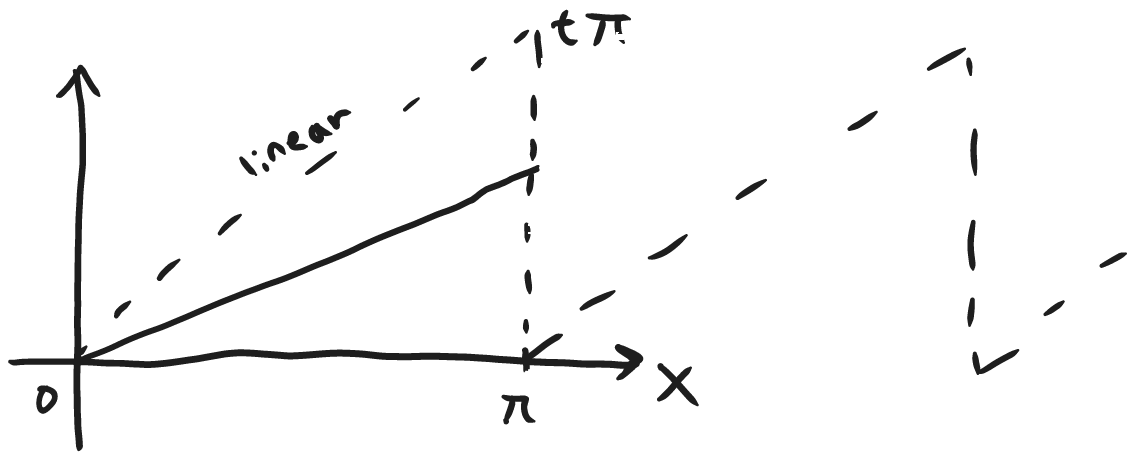2.8 KiB
#start of lec 35
last problem of the course which we will finish today.
\frac{ \partial^2 u }{ \partial t^2 }=\frac{ \partial^2 u }{ \partial x^2 }+tx, 0\leq x\leq \pi t>0
thats a driven wave equation. tx is the source term.
u(0,t)=u(\pi,t)=0 \quad t>0
u(x,0)=\sin(x) \quad 0\leq x\leq \pi
\frac{ \partial u }{ \partial t }(x,0)=5\sin(2x)-3\sin(5x)\quad 0\leq x\leq \pi
if any of the boundary conditions are non zero, then we have to split(?) into X and T.
in this case there's a \sin(x) term so its a nonhomogenous equation (?)
when tx wasn't there in last problem we had the solution:
u(t,x)=\sum_{n=1}^\infty \underbrace{ (a_{n}\cos(nt)+b_{n}\sin(nt)) }_{ u_{n}(t) }\sin(nt) notice L=\pi
if we expand tx:
tx=\sum_{n=1}^\infty h_{n}\sin(nx) (this is called a formal expansion, the two arent exactly equal due to the discontinuouity in tx.)
h_{n}=\frac{2}{\pi}\int _{0} ^\pi tx\sin(nx)\, dx

continuous between 0 and pi but on the edge ponts, the foureir sin series will converge to the midpoint of the two edge points.
h_{n}=\frac{2t}{\pi}\int _{0}^\pi x\sin(nx)\, dx=- \frac{2t}{\pi n}\left( x\cos(nx)|_{0}^\pi-\int _{0}^\pi \cancel{ \cos(nx) }\, dx \right)
h_{n(t)}=\frac{2t}{n}(-1)^{n+1}
h(x,t)=tx=\sum_{n=1}^\infty h_{n}\sin(nx)=\sum_{n=1}^\infty \frac{2t}{n}(-1)^{n+1}\sin(nx)
\frac{ \partial^2 u }{ \partial t^2 }=\sum_{n=1}^\infty u_{n}''(t)\sin(nx)
\frac{ \partial^2 u }{ \partial x^2 }=\sum_{n=1}^\infty -u_{n}(t)n^2\sin(nx)
\sum_{n=1}^\infty \underbrace{ \left( u_{n}''+n^2u_{n}+\frac{2t}{n}(-1)^n \right) }_{ =0 }\sin(nx)=0
u''_{n}+n^2u_{n}=\frac{2}{n}(-1)^{n+1}t, \quad n=1,2,\dots
use #mouc (or laplace, but that'll take much longer.)
characteristic eq:
r^2+n^2=0
r_{1,2}=\pm in
u_{n}^h(t)=a_{n}\cos(nt)+b_{n}\sin(nt)
u_{n}^p(t)=At+B
B=0 because there's no constant term on the RHS
A=\frac{2(-1)^{n+1}}{n^3}
u_{n}(t)=a_{n}\cos(nt)+b_{n}\sin(nt)+\frac{2(-1)^{n+1}}{n^3}t
u(x,t)=\sum_{n=1}^\infty(a_{n}\cos(nt)+b_{n}\sin(nt)+\frac{2(-1)^{n+1}}{n^3}t)\sin(nx)
This is the last problem I'll be solving in my career. This is the last time he's teaching math 201 :( or any course for that matter.
u(x,0)=\sum_{n=1}^\infty a_{n}\sin(nx)=\sin(x)
a_{1}=1, \quad a_{k}=0, \quad k=2,3,\dots
audio recording started
\frac{ \partial u }{ \partial t }(x,0)=\sum_{n=1}^\infty\left( b_{n}n+\frac{2(-1)^{n+1}}{n^3} \right)\sin(nx)=5\sin(2x)-3\sin(5x)
coefficients =0 if n\ne_{2},5
\implies b_{n}=\frac{2}{n^4}(-1)^n, \quad n\ne_{2},5
b_{2}=\frac{5}{2}+\frac{2(-1)^2}{2^4}
b_{5}=-\frac{3}{5}+\frac{2(-1)^5}{5^4}
u(x,t)=\cos(t)\sin(x)+\frac{5}{2}\sin(2t)\sin(2x)-\frac{3}{5}\sin(5t)\sin(5x)+2\sum_{n=1}^\infty \frac{(-1)^{n+1}}{n^3}\left( t-\frac{\sin(nt)}{n} \right)\sin(nx)
finished the solution
#end of lec 35
man I got teary eyed from this lecture.